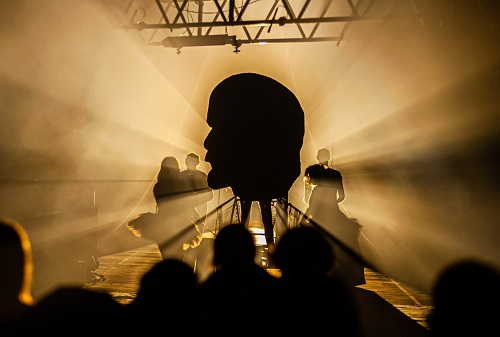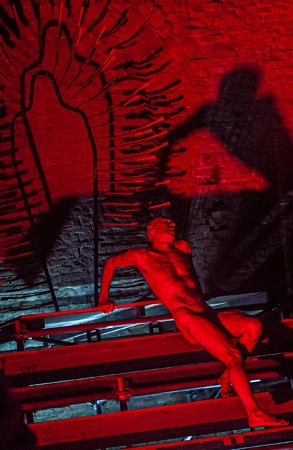For two weeks in January each year, the Prototype Festival brings small-scale and experimental musical theater to New York. The focus is on new works that draw not so much on the canonic operatic tradition as on musical, cabaret, film, new concert, post-classical, rock and pop genres.This year’s program included Roman Grygoriv and Illia Razumeiko’s Chornobyldorf, a work that premiered in Kyiv in November 2020 and then toured Europe. The composers are young Ukrainians with classical conservatory training, but also strong folk, popular and countercultural influences.
As I entered La MaMa Experimental Theater Club in the East Village, prominent notices warned of nudity, disturbing content, strobe lights and extreme volume. (To cope with the last, the ushers issued earplugs.) Then, for 140 intermission-less minutes, a dozen singers raced around a dark performance space under clouds of incense and a large video screen, reenacting what seemed to be a series of religious or civic rituals. Accompanying them were four musicians (including the composers) on acoustic guitar, cello, percussion and the zither-like Ukrainian bandura—all heavily amplified and digitally manipulated—with occasional addition of brass and keyboard.

As promised, the music was loud, the lighting intense, and the performers often naked. Even more unusual was the lack of intelligible text. But for a few fragments in Latin, Ukrainian and English, the libretto relied either on an artificial nonsense language or guttural grunts, groans, or growls.
What was the point of it all? The program notes invite listeners to view the work as a science-fiction story about a small band of individuals wandering through a post-apocalyptic world. Beyond a few striking video images of factories, churches and libraries reduced to rubble, however, the composers make little effort to elaborate this dystopian cliché in any further detail.
A deeper view of this work, which is subtitled An Archaeological Opera in Seven Novels, would be to view it as an investigation of post-modern historical memory. Each of seven scenes begins an excerpt from a traditional work performed ‘straight’: Bach’s B Minor Mass, a Mahler symphony, Byzantine-inspired chants, Ukrainian ‘white’ (vibrato-less) singing, a folk song, or a Communist march. Those on stage seek to imitate these elements, but after a few minutes can express only distorted and incoherent jumbles of melodies, sounds, phrases, and rituals. In the final scene, entitled ‘Saturnalia’, everyone gyrates ecstatically around the stage, seemingly unconscious of their surroundings, accompanied by a deafening wall of sound.
The point seems to be that cultural appropriation is inevitable in a post-modern world—and yet, in the end, produces only chaos. While this core idea itself is not new—Charles Ives’ Unanswered Question, written in 1908, portrays it in elegantly succinct and mystically existential form—the naively tragic combination of ecstasy and sorrow Chornobyldorf portrays is unique.
Overall, the resulting atmosphere resembles nothing as much as the drug-fueled rock festivals, concerts, pop operas, and spiritual happenings I attended in San Francisco during the late-1970s. To be sure, the mode of expression can be repetitive and overwrought, and the pop spirituality is sometimes cringe-worthy. Who knows whether to laugh or cry while watching minutes of a naked singer howling: “Euridice does not exist!”?

Yet Chornobyldorf meets the ultimate standard for any operatic concept, namely that it inspires distinctive musical creativity. Grygoriv and Razumeiko excel especially in developing and melding novel timbres. They reimagine traditional folk and jazz instruments, often distorting their sound. They bow the bandura and guitar to produce eerie sounds: squeaks, sighs, and scrubbing sounds akin to a string player playing col legno, ponticello, sul tasto or flautato. They sing through brass instruments, generating sounds akin to an elephant, birds, and other animals. Accordions are played by bounding them vertically. They elicit strange resonances from non-Western percussion instruments. And they replace standard harmonies with micro-tones. All this frantic creativity comes together in ways that were, somewhat inexplicably, compelling. The enthusiastic applause that followed the performance I attended many shared my appreciation for their efforts.
Afterwards, passing a pot shop on the way to the subway, a final question came to mind that has rarely arisen since those days of San Francisco happenings: would I have enjoyed the show even more stoned?
Andrew Moravcsik
Chornobyldorf: An Archaeological Opera in Seven Novels
Music by Roman Grygoriv and Illia RazumeikoLibretto by Yurii Izdryk, Publii Ovidii Nazon, Ivan Kotlyarevskyy, Illia Razumeiko
Singers – Yuliia Alieksieieva, Zoltan Almashi, Yevhen Bal, Ihor Boichuk, Roman Grygoriv, Kateryna Hordiienko, Ievgen Malofeiev, Mariia Potapenko, Mariia Shtyrbulova, Nazguhl Shukaiva-Hiventar, Illia Razumeiko, Yuliia Vitraniuk, and Diana Ziabchenko; Costume Design – Kateryna Markush, Video Design – Dmytro Tentiuk, Sound Design – Vladyslav Kotlenko, Lighting Design – Svitlana Zmieieva, Instrument Design – Evhen Bal
La MaMa Experimental Theater Company as part of the Prototype Festival; 19 January 2024.
ABOVE: Photo credit: Artem Galkin